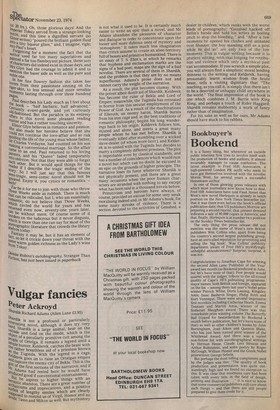Vulgar fancies
i)eter Ackroyd sha -r-d.ak Richard Adams (Allen Lane £3.95) 1ikiS not a profound or particularly havlesting novel, although it does try very cutu. Shardik is a large animal, bear on the obiside and God on the inside, which is the pet of a peculiarly primitive cult among the sliu(3,,P!e of Ortelga. It remains a legend until a th.."`e hunter, Kelderek, catches the beast with asrather breathless aid of a priestess known Tuginda. With the legend in a cage, ao,clerek goes on to raise an Ortelgan empire gisu,, capture the enemy city of Bekla. This is the Mr' of the first sections of the narrative, and if pro Adams had rested here he would have ad„14,ced good if conventional entertainment. her he aspires to higher things with an rnitic abandon. There are a great number of a'reha • su,i cisms and imprecations, and a positive seir of lengthy similes which are clearly ePosed to remind us of Virgil, Homer and no "ribt Tasso and Milton as well. But mythistory
is not what it used to be. It is certainly much easier to write an epic than a novel, and Mr Adams abandons the pleasures of character and dialogue in order to concentrate upon the looser and more dubious ones of mystery and 'atmosphere.' It takes much less imagination than critics assume to create an alien territory full of beasts and primitive humankind. There is an essay of T. S. Eliot's, in which he remarks that hyphens and exclamation marks are the signs of a bad poet; maps are the sign of a bad novelist. There are several of them in Shardik, and the problem is that they are by no means superfluous. Adams's prose does not and cannot carry the weight of the narrative. As a result, the plot becomes clumsy. With the potent albeit dumb aid of Shardik, Kelderek has become the ruler of Bekla and Lord of Empire; meanwhile, the Tuginda has retreated in horror from this secular employment of the Power of God. As a result of the machinations of Elleroth, an enemy baron, Shardik bursts from his iron cage and, in the best traditions of romantic philosophy, begins his long wanderings back to his origin. Kelderek follows him, injured and alone, and meets a great many people whom he has met before. Shardik is eventually killed after stumbling over a wicked slave-dealer (of whom more later), and Kelderek is re-united with the Tuginda but decides to marry a completely different priestess. The plot is improbable even by classical standards, and has a number of coincidences which would ruin a novel but which can no doubt be excused in an epic on the grounds of higher principle. The narrative loses its force whenever Shardik is not physically present, and there are a great many occasions when the poor human characters are stranded with nothing to say except what has been said in a thousand novels before. Primitivism and heroism have always, of course, provided an excuse for some very weak moralising indeed and, in Mr Adams's book, for some nasty streaks of violence. There is a section devoted to the activities of Genshed, a
dealer in children, which ranks with the worst kinds of pornography: "Genshed hacked off, Bellin's hands and held his wrists in boiling pitch to stop the bleeding," and "After a few moments he opened his clothes and urinated over Shouter, the boy standing still as a post while he did so" are only two of the low moments. This is vulgar writing because it is prurient writing, with that longing for retribution and violence which only a mythical past can accommodate. If you scratch a simple plot, you will always find a simplistic moral lending thinness to the writing and Kelderek, having presumably learnt wisdom from the brute beast, tells a visiting dignitary that "The teaching, as you call it, is simply that there isn't to be a deserted or unhappy child anywhere in the world." The final impression of the book is one which combines J. M. Barrie with King Kong, and perhaps a touch of Rider Haggard; Shardik remains stubbornly a work of fancy rather than of imagination.
For his sake as well as for ours, Mr Adams should have stuck to his rabbits.


































 Previous page
Previous page